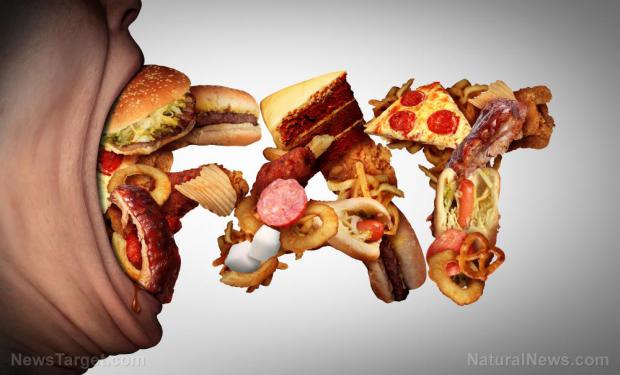
Breaking News
 Quick Take: Gold from lead and ancient alchemy
Quick Take: Gold from lead and ancient alchemy
 HEALTH SECRETS: How to Instantly Block MSG Toxicity Using Natural Substances...
HEALTH SECRETS: How to Instantly Block MSG Toxicity Using Natural Substances...
 STEATOTIC LIVER DISEASE stems from people who scarf down a whole meal in less than 5 minutes...
STEATOTIC LIVER DISEASE stems from people who scarf down a whole meal in less than 5 minutes...
 Newsom to SEIZE MALIBU COAST to build massive 15-minute city after weather weapons destroyed...
Newsom to SEIZE MALIBU COAST to build massive 15-minute city after weather weapons destroyed...
Top Tech News
 Cavorite X7 makes history with first fan-in-wing transition flight
Cavorite X7 makes history with first fan-in-wing transition flight
 Laser-powered fusion experiment more than doubles its power output
Laser-powered fusion experiment more than doubles its power output
 Watch: Jetson's One Aircraft Just Competed in the First eVTOL Race
Watch: Jetson's One Aircraft Just Competed in the First eVTOL Race
 Cab-less truck glider leaps autonomously between road and rail
Cab-less truck glider leaps autonomously between road and rail
 Can Tesla DOJO Chips Pass Nvidia GPUs?
Can Tesla DOJO Chips Pass Nvidia GPUs?
 Iron-fortified lumber could be a greener alternative to steel beams
Iron-fortified lumber could be a greener alternative to steel beams
 One man, 856 venom hits, and the path to a universal snakebite cure
One man, 856 venom hits, and the path to a universal snakebite cure
 Dr. McCullough reveals cancer-fighting drug Big Pharma hopes you never hear about…
Dr. McCullough reveals cancer-fighting drug Big Pharma hopes you never hear about…
 EXCLUSIVE: Raytheon Whistleblower Who Exposed The Neutrino Earthquake Weapon In Antarctica...
EXCLUSIVE: Raytheon Whistleblower Who Exposed The Neutrino Earthquake Weapon In Antarctica...
 Doctors Say Injecting Gold Into Eyeballs Could Restore Lost Vision
Doctors Say Injecting Gold Into Eyeballs Could Restore Lost Vision
STEATOTIC LIVER DISEASE stems from people who scarf down a whole meal in less than 5 minutes...

Ever eat too quickly and get an upset stomach? In America, a meal served to one person at the average restaurant could feed a whole family. Your stomach is about the size of your fist and only meant to work on a limited amount of food at a time, but millions of people eat too much food in one sitting and much too quickly.
Now science and medicine are revealing that eating a meal in less than 5 minutes can do long-term damage to your liver. This is happening quite frequently in our "rush hour" all day world, where people rush through their meals on the go, during work breaks, and when they're "starving" for more junk science food stuff that they're addicted to, thanks to excitotoxins in foods. Let's take an inside look at the science behind Steatotic Liver Disease that's sweeping the country, and what to do about it.
"Speed Eating Linked to Liver Damage, Study Finds – But the Fix Is Simple"
In today's fast-paced world, eating quickly has become a common habit—but new research suggests it could be silently harming one of the body's most vital organs. A study from China, involving nearly 2,000 participants, reveals that consuming meals in under five minutes significantly increases the risk of metabolic dysfunction-associated steatotic liver disease (MASLD), regardless of weight or diet quality. The findings, published in Nutrition & Diabetes, highlight an overlooked health hazard in modern eating habits—one that experts say can be reversed with simple behavioral changes.
The study, conducted across 10 medical centers in China, found that 59.3% of frequent fast eaters developed MASLD, compared to just 46.2% of those who ate slowly. Even after accounting for factors like weight and diabetes, the link remained strong. "Fast eating appears to trigger a cascade of metabolic problems," researchers noted, including elevated liver enzymes, higher blood pressure, and increased waist circumference—all markers of liver stress.
The liver processes nutrients and filters toxins, but when food is consumed too quickly, the body misses crucial satiety signals. Hormones like GLP-1 and peptide YY, which regulate appetite, need time to activate. Fast eaters often overconsume calories before feeling full, leading to fat accumulation in the liver. Additionally, rapid eating disrupts the gut-liver axis—the communication between digestive bacteria and liver function—further worsening metabolic health.
Surprisingly, the study found the strongest association in normal-weight individuals (BMI under 25), non-smokers, and women. This suggests fast eating is an independent risk factor, not just a pathway to obesity-related liver disease. "People assume they're safe if they're not overweight, but this research shows otherwise," said one expert.



